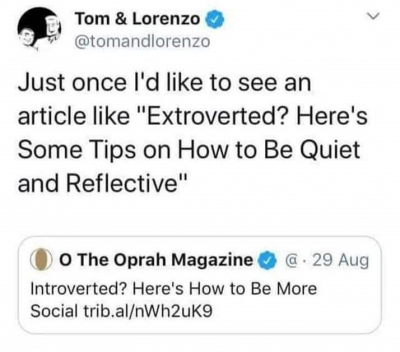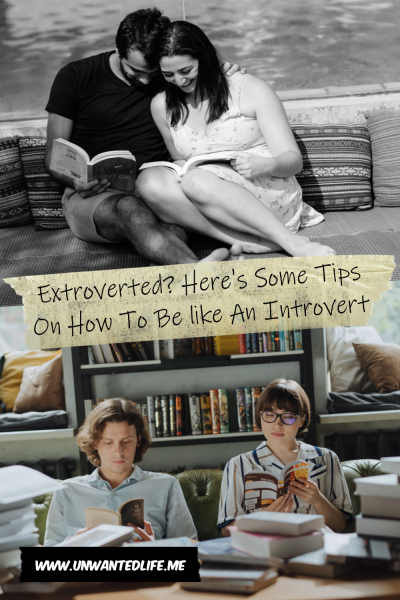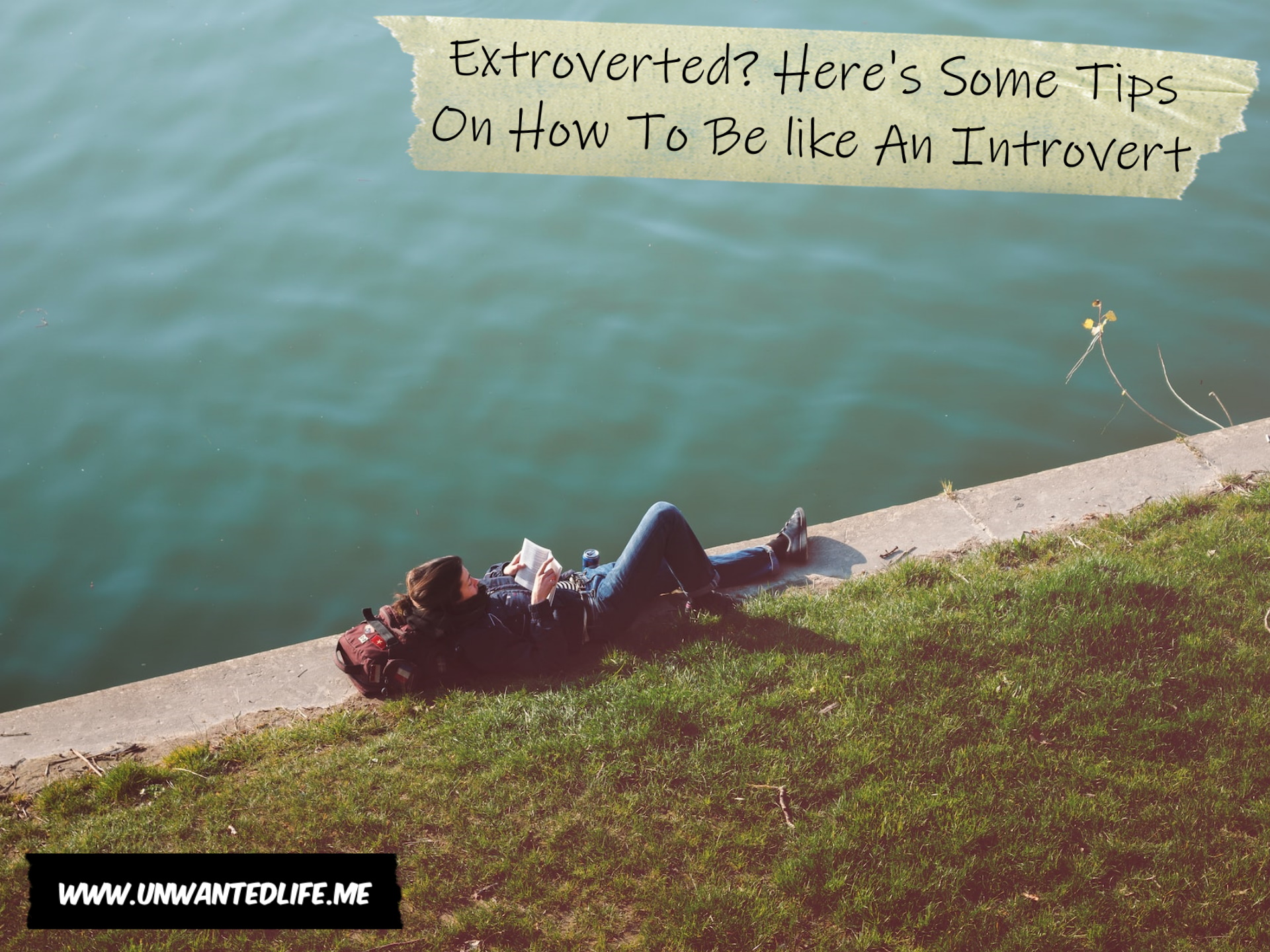I saw this screenshot of a tweet while scrolling through Facebook and I couldn’t help but agree. I used to say I was an introvert in an extrovert’s body, but I think now I’m just an introvert. Although I was inspired to write this article because of this tweet, it appears a few other people were as well. Nevertheless, I hope my spin on how not to be so extroverted and why it’s beneficial will still be a worthwhile addition to this idea.

What Does It Mean To Be Extroverted?
To be extroverted is to have a disposition that is energised through social engagement but struggles with solitude, resulting in a personality that is gregarious, outgoing, and sociable (Dictionary.com). Simply put, you have an outward perspective.
What Is An Introvert?
Often, people who are introverts are considered to be shy, but shyness and introversion aren’t the same things (Cain, 2012). Shyness is the tendency to feel awkward, worried, or tense during social encounters (APA). However introverts are people who prefer minimally stimulating and quiet environments (Cain, 2012). Introverts can engage in social encounters without feeling shy or fearful of being in such a situation. You can even be a shy extrovert.
An introvert is someone who feels more comfortable focusing on their inner thoughts and ideas, as well as enjoying spending time with one or two people rather than a large group (WebMD). In short, they have an inward perspective, which means they’re less likely to seek out external stimulation (Verywell Mind).
Although shyness isn’t synonymous with being an introvert, they can overlap. That’s because a shy person might become more introverted over time because they find socialising so difficult to manage (Cain, 2012). Therefore, a shy person might seek to avoid that discomfort by minimising their social encounters. Shyness at this level would likely become social anxiety.
What Can Extroverted People Learn From Being An Introvert?
Until I decided to write this article, the only articles I’d seen on this topic were about how to stop being an introvert. For some reason, being extroverted is the accepted ideal, but why? Like most things in life, they exist on a spectrum. Granted, some extreme introverts might struggle with life, but extremely extroverted people also come with problems.
Spending time alone
There was a point in my life where I couldn’t cope without interacting with people and needing a blowout at the weekend. When that didn’t happen, I would be crushed by nihilistic depression and become suicidal. This meant I was constantly living on a knife’s edge until I did something about it. The result of this was becoming comfortable spending time on my own. In becoming like that, my mental health was stabilised, and I became a LOT less suicidal.
The benefit of being ok with spending time on your own is that you don’t need other people to be into the same hobbies as you. So you can engage in creative and crafting tasks on your own or anything you might find interesting.
Being self-aware
A skill often lacking in our extroverted counterparts is the ability to be introspective and self-aware (Hack Spirt). Introverted people will take time to review their actions and behaviours. This allows the introvert to change their behaviour in the future if the results aren’t as expected. For example, they could reflect on an event they attended to see if they said or did something that caused someone to feel hurt.
The ability to self-reflect means introverts can adapt to changes in norms and values quicker than those who are extroverted. At work, an introvert’s calm, measured, lack of impulsivity, and thoughtful attitude can be beneficial to work projects and work relationships (Psych Central). Therefore, someone who is extroverted might benefit from knowing when to use self-awareness to help further their career. It will also help with managing healthier relationships.
Empathy
Introverts often wonder what life is like for other people. They can be fascinated by other people and what drives them to do what they do. This is a skill that our governments could benefit from. Wanting to know what life is like for other people allows you to be empathetic. You can walk in someone else’s shoes as much as that is possible because you’re interested in their experience and life. It’s a level of curiosity that can help drive a more inclusive mindset. Much like being self-aware can.
You’ll often find therapists have introverted traits because you need to be compassionate and considerate to develop a therapeutic relationship with your clients. But it doesn’t stop there. The ability to see things from another’s perspective is also beneficial at work.
It helps with problem-solving, conflict resolution, product development, marketing, etc. (Upskilled). It’s also a valuable trait to have for creating and maintaining healthy relationships with your loved ones. Thus, extroverted people could benefit from being more empathetic in every aspect of their lives.
Communicating
One thing most people would agree on about extroverts is that they appear to be skilled conversationalists. But is that really true? While they may get energised from engaging with other people, that doesn’t always mean they’re a brilliant company (Psych Central). The issue can be that an extroverted person is good at talking, but not so good at listening.
An often overlooked quality of being an introvert is the ability to think before speaking, which allows an introvert to process information before responding rather than just reacting (Diary Of An Introvert).
I talked about ‘active listening’ in my article about using motivational interviewing techniques to help a loved one. That’s because it’s an important skill to have if you don’t want to keep finding yourself in one-way conversations. Thus, those of us who are extroverted might benefit from being quiet more in conversations, engaging in active listening, and thinking before we speak.
Remember to ask questions (open-ended ones where possible) rather than talking about yourself (here’s looking at you, mum). You should also avoid interrupting the person talking, something I’m guilty of, but I always apologise and give the floor back to the person I interrupt.
For more tips on this, check out my article about Using Motivational Interviewing To Help A Love One and check out Be Quiet by wikiHow.
Validation
One ability I wish I had as an introvert is the ability to not care about what people think. However, given my childhood, this isn’t something I’ve been able to develop to a level I would like. According to an article written by the Huffington Post, extroverted people often need social validation. The problem with that is you’ll never be satisfied. Satisfaction and happiness come from internal validation. Don’t get me wrong, external validation can and does feel good, but it shouldn’t be the form you seek.
Because introverts don’t have a pressing need to gain attention and approval, they’re able to spend quality time on the relationships that matter to them (Psych Central). Simply put, introverts can make for great close friends and fantastic romantic partners. They are also more likely to distance themselves from toxic relationships, as toxic and empty relationships are seen as draining and a waste of time (She Dreams All Day).
An extroverted person, and myself, could benefit from not worrying about what other people think and FOMO because what other people think doesn’t really matter. Remember, quality trumps quantity when it comes to relationships.
Alphas
The concept of an alpha doesn’t really exist, but the fact that some people think it does is very telling. If you need to be it and you need to claim you’re it, then you’re not it. If you are driven by a need to prove yourself, then you’re showing that you can only function with that validation.
Rarely is someone who claims to be an alpha, a person you want in your life, because they have traits that are draining and problematic (Cain, 2012). Because introverts are seen as shy, and thus submissive (which they’re not), they’re often overlooked. But the reality is, they’re the ones making the smart choices. Thus, extroverts can benefit from ditching the alpha ideal, not just for their own happiness, but for the happiness of those around them.
Decision making
A study by Khalil (2016) on 270 randomly selected participants from Pakistan found that introverts make better decisions than their extroverted counterparts do. Introverts are less likely to make impulsive decisions. They also found that because extroverts don’t like thinking about such things, they’ll postpone decision-making where possible. And, although extroverts do double-check information, they often need someone to steer them to the right decision if the decision is important.
That said, Khalil (2016) study has to be taken with a pinch of salt because it’s not generalisable because of the participants’ lack of diversity. That doesn’t mean the finding is wrong or won’t be proven in other countries and demographics, just that those studies need to be done so the findings can be confirmed.
According to Hack Spirt, there is evidence that introverts, not extroverts, make for better CEOs. That kind of makes sense. There’s nothing wrong with having a confident CEO, but you also want one that listens to advice and is able to think before taking action. Just look at how Elon Musk has found himself running Twitter because of a weed joke paying more than the company’s worth. He also has a catalogue of questionable behaviours.

Although extroverts are always considered good leaders because of their perceived interaction and communication skills, when it comes to making the right decision, introverts are better than extroverts. This is because introverts analyse every aspect of a situation in detail and view a situation from different angles (Khalil, 2016).
In short, being extroverted and being comfortable talking to people in large and small groups can only get you so far. You need to learn how to listen and to make decisions carefully rather than reckless.
Leadership
Populist leaders always tend to be the ones we saddle our countries with because they can talk a good game. The problem is, 9/10 they’re a disaster when they’re actually in charge. We’re told to learn from history to avoid making the same mistakes again, but as a species, we’re still making this mistake when it comes to our leaders.
So it may come as a surprise to know that introverts are more likely to be the most effective leaders. According to Walden University, introverted leaders encourage others to contribute and their active listening skills draw out the best in those surrounding them. They’re also observant and notice the details, which means they can notice important information that might otherwise be overlooked.
For example, if Liz Truss had listened to anyone at all, she would have known that her tax cuts would tank the British economy. If she’d listened, she would still be the Prime Minister. Don’t be like Liz Truss. Listen.
Creativity
The creative industry is often looked down upon. The UK government during the pandemic spent taxpayers’ money on telling people within the creative industry to reskill for cyber security. Thus, creativity as a desirable skill can also be looked down on in general.
However, creativity can have a lot of uses, including problem-solving. And, according to Upskilled, being an introvert can foster greater creative thinking and work. Creativity is what drives our species and separates us from other animals.
Self-care
Introverts can often feel drained after spending time with people, going to events, etc. (Hack Spirt). This is often seen as a bad thing, but here’s why that’s not always the case. Introverts are more likely to prioritise their wellbeing as a result of feeling drained by such interactions. That means introverts are more likely to protect themselves from burnout, whereas the extroverted are less likely to see their downtime as a priority (Huffington Post).
Small talk
According to Cain (2012), research suggests that happiness comes from having meaningful conversations, rather than small talk. And I couldn’t agree more. Introverts prefer these kinds of interactions because small talk is just pointless busy talk.
I long for the days when I used to be with a friend(s) or a partner looking at the stars and just having deep conversations. That was when I was at my happiest. So let’s bring back deep conversations rather than asking about what someone does for a living. You’ll definitely be remembered when at networking events if you do.
Boundaries
The main difference between my mum and me is that she’s an extrovert, to the point that she’ll forget and ignore your boundaries. So much so that she doesn’t notice that she’s pushed everyone away, causing her to be isolated. Thus, extroverts might want to learn to have boundaries themselves but also respect the boundaries of others. Otherwise, you may find yourself without any close friends and other loved ones. You may still have a lot of friends, but they will most likely be more like acquaintances. Sometimes, it’s quality over quantity, especially if you want to feel happier with life.

Self-sufficiency
The amount of extroverted people I’ve met who didn’t know how to do basic things like cooking a can of baked beans has been eye-opening. Being able to be self-sufficient is an advantage because you can look after yourself and focus on what matters (Psych Central).
The ability to function independently of other people means other people won’t let you down and you’ll be less bothered by people letting you down. I used to struggle with this for a long time, although this had more to do with my borderline personality disorder than anything else.
At work, this will mean you require less supervision than your extroverted counterparts, making you more reliable with task completion. This also means that your managers can trust you to finish a task rather than getting distracted by socialising (Introvert Dear). Being able to work in a team is also a worthwhile skill, but being trusted to work independently makes you a valuable employee. So take heed, extroverts.
The devil is in the details
Because introverts are naturally observant, they’re less likely to overlook any details which can boost productivity (Life Hack). This is actually a trait they share with some people with depression. You can find potential issues before the fact, rather than after, which can save a lot of hassle. If you’re an extrovert who keeps finding yourself having to undo problems you’ve caused, then you might benefit from paying attention to the details.
Low-maintenance
Because introverts can be very self-sufficient, they can be very low-maintenance. Most introverts won’t be called obnoxious, needy, or disruptive (Introvert Dear). This makes for healthier relationships.
Summary
Being extroverted or introverted exists on a spectrum. Too extreme one way and there’s likely to be problems. Ambivert people even exist, who are somewhere in the middle of the two. However, many introvert traits are valuable. But too often, these valuable traits are ignored. We could all benefit from behaving more like an introvert. We could all benefit from people being more empathetic in the world.
As always, leave your feedback in the comments section below. Also, please share your experiences with being extroverted or introverted in the comments section below as well. Don’t forget, if you want to stay up-to-date with my blog, then sign up for my newsletter below. Alternatively, get push notifications for new articles by clicking the red bell icon in the bottom right corner.
Lastly, if you’d like to support my blog, you can make a donation of any size below. Until next time, Unwanted Life readers.
References
Cain, S. (2012). The power of introverts. TED: Ideas Worth Spreading. Retrieved from https://www.academia.edu/download/55508436/QR_ebookMay8-2015.pdf.
Khalil, R. (2016). Influence of extroversion and introversion on decision making ability. International Journal of Research in Medical Sciences, 4(5), 1534-1538. Retrieved from https://www.researchgate.net/profile/Rehana-Noman/publication/301827761_Influence_of_extroversion_and_introversion_on_decision_making_ability/links/573c978a08aea45ee84196d4/Influence-of-extroversion-and-introversion-on-decision-making-ability.pdf.


It’s nice to read a post where introverts are celebrated.
I’ve been called ‘quiet’ and ‘shy’ all my life and made to feel those attributes are faults. However, in the right company, I’m actually outgoing and love a laugh. I just like my alone time; in fact I feel recharged after it. There are many scientists and inventors who are introverts.
Thank you for sharing your experience
I would consider myself as an introvert and I can totally relate to these things you mentioned about introvert. I don’t feel I’m a needy too
If anything, I’ve gone too far the other way when it comes to not being needy
I’m a secret introvert who’s really good at pretending to be an extrovert. It’s great to read about all the positive power of being an introvert.
I’m glad you liked finding out about some of your positive introvert powers
Another excellent and thoughtful post! I think I am an ambivert…or at least that’s what the Myers-Briggs Type Indicator tells me. When I was younger, I was more extroverted. As I have aged, I recognize the value of quiet, reflective time. I agree that introverts are often misunderstood, yet they have many valuable qualities.
Thanks for sharing your experience
I’m an introvert. But I can also be chatty and warm with people. It’s something I realised about myself since I’m working part time in the retail industry now. It’s great and makes me feel good about myself.
Thanks for sharing
I am in dancing profession and I have observed that even though both, the extrovert and introvert dancers, are visual learners, it is the speak-when-required dancers who are better leaders. Extrovert and loud dancers are highly competitive and often successfully manipulate people for better projects but students like to discuss their problems to introvert teachers much more freely. Thanks again for a wonderful article.
Thank you for sharing the interesting and personal insight
I think I am an introvert as I love time by myself a lot. Interesting discussion of the topic.
Personal time is the best time
Very interesting post! Although I think I would add in personality type Meyers Briggs and also attachment styles as this appears that there are only two types of people and I think there’s more to it.. For me, I was wayyy more extroverted in my younger years and now enjoy time alone and need it. I’m tired! 😀 I have always been introspective (yay overthinking and anxiety!) and also empathetic due to a fearful avoidant attachment style which I have worked on extensively. Very though provoking post though, I agree we can all learn something here! Thanks for sharing!
Thanks for commenting
this list makes me feel proud to be an introvert 😊💪🏻
There’s nothing wrong with being an extrovert, so always be proud
An excellent, interesting read. I’d say I’m an introvert who manages to allow his inner extrovert to pop up to the surface when it’s really needed. I still think I need to be a little more extrovert, but at least I’m happy enough with the balance. I think empathy and self reflection are really crucial.
Thanks for sharing.
As long as you’re happy with who you are, that’s all that really matters
I am definitely one of the people who evolved from being very extrovert in my teens and early adulthood to becoming an introvert and needing more space for myself and I have actually found it hard to deal with at first but now I completely embrace it as I love spending time by myself. Having time to reflect has indeed opened many doors and allowed me to dig into my potential and become creative and as a result I now have my own blog and can follow my passions. I still have friends and occasionally enjoy doing things in groups but I no longer seek any validation from anyone.
It’s a special kind of freedom to not need to have validation from other people. Thank you for sharing your story
Another very interesting post, thanks.
I think that I have become more introverted as I’ve got older.
And I’ve never much cared what others think or sought their approval.
I have to say that, in my experience, the suggestion that “an extroverted person is good at talking, but not so good at listening” is absolutely spot on. They aren’t really interested in what they, themselves, are saying either – its just a mechanism for attention-seeking.
It’s easy to find yourself trapped in a one way conversation with someone who’s an extrovert. And if you’re an introvert, you can find it hard to escape such conversations. A marriage made in hell for the introvert 🤣
I always thought I was in the wrong for not being loud, or over-confident, or for feeling drained by parties and company; or hating noisy atmospheres, or for asking deep and interesting questions that raised eyebrows. Then I was told I was an introvert, but how could I be as an actor and performer, and more internal questions were raised as to my validity is a person. Then I read a book called The Highly Sensitive Person and much of what you have said in this insightful post is also brought up in there. We are all different, and we all have our strengths and weaknesses, but being quiet in the Western world is seen as a weakness while we promote loud leaders who actually say and do very little but talk a lot. The wise ones are the quiet ones, and that book, and now this post, help me to accept who I am just that bit more. Thank you for this.
I’m glad you’ve been able to find a way to accept yourself. That book seems like it had a significant impact on your sense of self. Thanks for sharing your experience
An interesting read, which busts a few myths about being an introvert
Thank you
It’s always interesting to read an article and find yourself in it. We often see extroverts in the spotlights, at least that’s what we think. But we don’t really know, do we, unless we get to know that person.
There isn’t a better or worse one, we are who we are. That’s what we have to work with and make the best off. When I first looked into introversion, I also thought it had to do with shyness. But you very well point out that this isn’t like that. I recharge my battery by going inward, finding my moment of peace. But I can also interact with people well enough. But preferably two or three, large groups can be too overwhelming.
I could go on about the interesting things you mentioned here, but that would take too long. Thanks for writing this great expose and capturing a lot of me in it as well. At least I recognised myself and learned and confirmed some new and old beliefs.
You’re certainly right, we are who we are and we have to do the best with that. But that doesn’t mean you can’t seek to make improvements. It’s also important to have a place we can recharge, even if you’re not an introvert. Thanks for sharing your thoughts
Not often do you read a post that captures many questions and personalities traits of oneself. But this one did. It opened my eyes to things I knew and new things. We are what we are, extrover or introvert. Better learn to accept it and be who you are. A must read post
I’m glad you were able to connect with it on such a personal level
Such an interesting article. I consider myself an introvert but it’s so interesting to read about the traits and other types of people.
Thanks for commenting